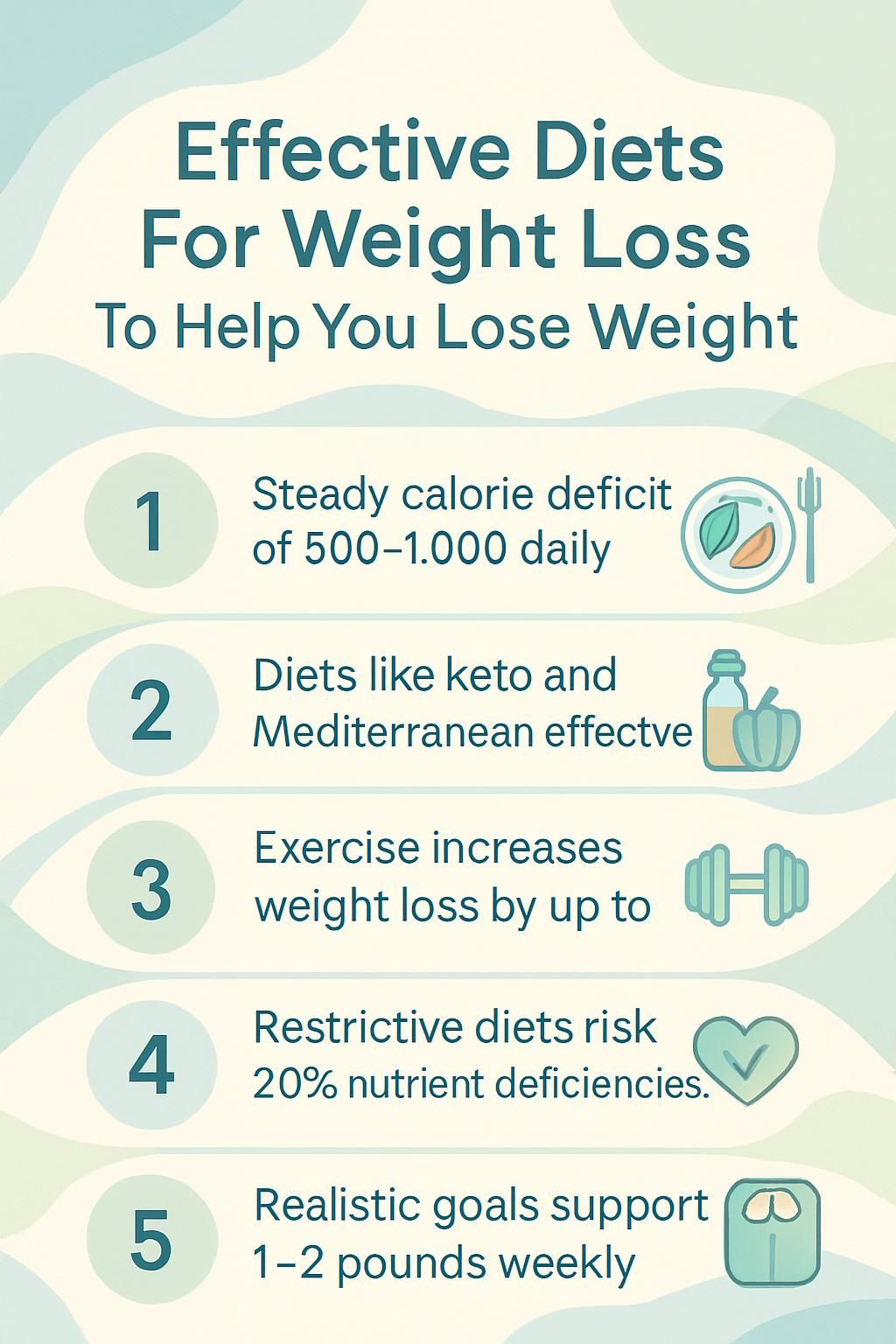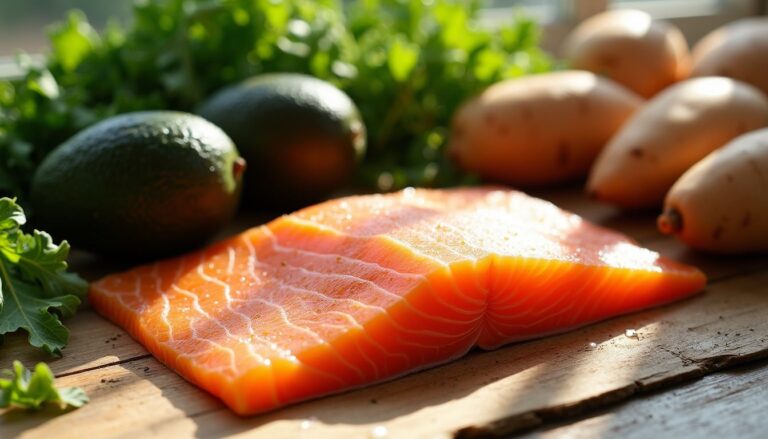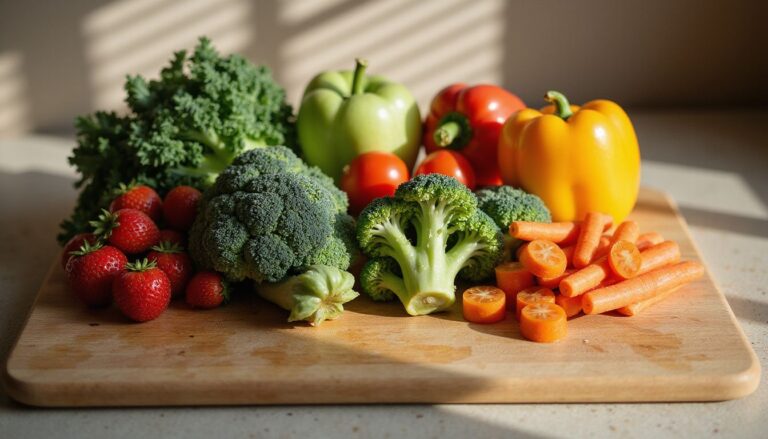Effective Diets For Weight Loss To Help You Lose Weight
Our Nutrition Assistant AI Suite will transform your body. You will lose fat, get toned, and build muscle. Gain confidence and optimal health.
Finding a diet for weight loss that helps you lose weight and keep it off can feel hard. Many adults in the United States live with excess weight, so you are not alone. A clear diet strategy, paired with small daily habits, can move you toward a healthy weight.
After reviewing plans like the Mediterranean diet, low-calorie approaches, plant-forward meals, and simple healthy eating rules, I saw what works for real life. Careful research and my own trial runs showed which choices help most with weight management.
In this guide, you will find practical steps on portions, smart food choices, and meal plans that support heart health while helping you shed extra pounds safely. I stick with plain language and evidence-backed ideas, so you can start with confidence.
Key Takeaways
- Creating a steady calorie deficit of 500 to 1,000 calories per day can lead to safe weight loss of about 1 to 2 pounds per week (Diabetes & Metabolic Syndrome, 2018).
- Evidence shows plans like keto, Mediterranean, DASH, and plant-based diets promote weight loss and heart health by focusing on whole grains, healthy fats, fruits, and vegetables.
- Combining regular exercise with diet changes can raise total weight loss by up to 20 percent compared with diet alone (2018 study).
- Overly restrictive or fad diets increase the risk of deficiencies, such as low iron or B12, with up to 20 percent affected on restrictive regimens (NIH data).
- Long-term success is linked to realistic goals, such as 1 to 2 pounds per week, and adjusting your plan based on tracked progress (CDC guidance).

What Should You Know About Weight Loss Diets?

Choosing a healthy diet strategy shapes weight management and affects conditions like obesity or type 2 diabetes. I use trusted research to explain how food choices guide your weight-loss journey.
How does a calorie deficit help with weight loss?
A calorie deficit means eating fewer calories than your body uses each day. This gap makes your body use stored fat for energy, which lowers body weight. Research shows that cutting 500 to 1,000 calories per day can lead to 1 to 2 pounds lost each week.
Pair the deficit with nutrient-dense food. Whole grains, lean protein, beans, fruits, and vegetables help protect muscle while you lose fat. Fiber keeps you full longer and makes the plan easier to follow.
I once logged meals in a simple app and watched portions closely. That one habit helped me hit my calorie target without feeling deprived. These steps make it easier to reach and maintain a healthy weight.
Why is balancing nutrition and sustainability important?
Focusing only on calories can weaken nutrition and make a plan hard to keep. Eating patterns that support your health and work long term bring better results for both you and the planet.
Plans lower in saturated fat and higher in vegetables, fruit, beans, and whole grains supply key nutrients and lower heart risk. Shifting toward more plant foods also lowers greenhouse gas emissions compared with diets high in red meat.
Choosing healthy fats like olive oil and nuts instead of butter or fatty meats supports your heart. Studies link Mediterranean and Nordic eating with lower blood pressure and reduced cardiovascular disease, while using resources more wisely.
Choosing foods that are good for both our bodies and the planet is key to healthy living.
Popular Calorie-Restricted Diets for Weight Loss
Calorie-restricted plans help many people lose weight by adjusting the type of food and, at times, meal timing. Pick the style that fits your daily routine.
What is the ketogenic diet and how does it work?
The ketogenic diet is low in carbohydrates and high in fat. Common foods include eggs, cheese, nuts, olive oil, and fish. When carbs stay very low, usually under 50 grams per day, the body enters ketosis. In ketosis, the liver makes ketones from fat for energy instead of relying on glucose from carbs.
I noticed steady weight loss when I followed keto for three months. Studies suggest some people lose more weight on keto than on low-fat plans over six months. Reviews also report better blood sugar control and reduced appetite for certain individuals.
Keto can work fast for some, but it requires careful planning and attention to fiber, fluids, and electrolytes. If you have diabetes or take medicines, talk with a healthcare professional before you start.
1) Diabetes & Metabolic Syndrome: Clinical Research & Reviews (2018); 2) Systematic review and meta-analysis, British Journal of Nutrition (2020).
How does a low-fat diet promote weight loss?
Fat has about 9 calories per gram, while protein and carbs have about 4. Cutting fat can lower your daily calories without shrinking the amount of food on your plate. Many people shift toward low-fat dairy, legumes, vegetables, fruit, and whole grains and reduce fatty desserts or high-fat meats.
Simple swaps help. Choose baked potatoes over fries. Pick broth-based soups instead of creamy ones. Make salads with greens, beans, and grains. I once traded my cheese sandwich for vegetable soup and yogurt. I stayed full all afternoon at fewer calories.
Fat contains more than double the calories per gram compared to protein or carbs.
What are the benefits of intermittent fasting?
Intermittent fasting limits the hours you eat each day or the days you eat more or less. This pattern can reduce total calories without measuring every bite. Research from 2019 links intermittent fasting with lower insulin levels and better metabolic health. Some studies also show less inflammation.
Typical results show modest weight loss, about 3 to 8 percent over 3 to 24 weeks. I followed a time window last year and noticed less snacking and clearer focus in the mornings.
Intermittent fasting can pair well with the Mediterranean diet if you want extra heart benefits. It is still important to choose balanced meals during the eating window.
Nutrient-Focused Diet Plans
Nutrient-focused diets aim for health gains beyond the scale. They support your heart, brain, and circulation with whole foods rich in fiber, minerals, and healthy fats.
How does the DASH diet support heart health and reduce sodium?
The DASH diet highlights fruits, vegetables, whole grains, nuts, and low-fat dairy. These foods supply potassium, calcium, magnesium, and fiber. Together they help lower blood pressure.
I felt more even energy when I swapped salty snack foods for fruit and a small handful of nuts. The eating pattern also trims sodium by limiting cured meats and many canned soups.
The American Heart Association notes that DASH can reduce systolic blood pressure by about 5 to 6 mm Hg within weeks. Research also links DASH with better cholesterol and lower stroke risk.
What makes the Mediterranean diet effective for weight loss?
The Mediterranean diet centers on vegetables, fruits, whole grains, beans, nuts, and olive oil. These foods are high in fiber and healthy fats, which help control hunger. I felt fuller when I ate lentils, roasted vegetables, and whole grain cereal for breakfast.
People following this plan usually eat less red meat and fewer processed foods. Olive oil often replaces butter for cooking and salad dressings.
Large studies connect this style of eating with lower heart disease and some cancer risk. Researchers report that it supports weight loss because it curbs appetite and provides steady energy through the day. Slow, social meals may also help reduce overeating.
1) Mayo Clinic resources; 2) Harvard T.H. Chan School of Public Health.
Why choose a plant-based diet for weight loss?
A plant-based diet focuses on vegetables, fruits, whole grains, legumes, nuts, and seeds. Research from 2021 shows many people lose more weight with plant-based eating compared with traditional diets.
These foods are rich in fiber and usually lower in saturated fat. I found that cutting back on meat reduced my daily calories without much effort. Plant foods also support a healthy gut, which is tied to better metabolism.
Use roasting, baking, or grilling to build flavor with less oil. Mayo Clinic materials suggest plant-forward patterns can help with long-term weight management and heart health and may improve cholesterol levels.
Flexible and Popular Weight Loss Diets
Some plans are more flexible, which can make them easier to stick to in daily life.
What is the flexitarian diet and how flexible is it?
The flexitarian diet is mostly plant-based but allows meat, fish, or dairy in moderation. I focus on vegetables, whole grains, nuts, and fruits most days, then add cottage cheese or lean chicken when I want variety.
This approach supports weight loss without strict rules. It fits different schedules and social events, so many people maintain it longer. The plan aims for balance and enough nutrition while you lose weight at your own pace.
How does the volumetrics diet help you eat more and weigh less?
The volumetrics diet favors foods that are low in calories but high in volume. Think vegetables, fruit, whole grains, and broth-based soups. These choices fill your stomach and help control hunger.
Research led by Dr. Barbara Rolls shows that meals with lower calorie density can keep you fuller while you eat fewer calories. I often build large salads with greens and a lean protein. That one plate keeps me satisfied past lunch and cuts cravings.
Studies from 2013 to 2021 support weight loss with water-rich foods. Volumetrics does not ban food groups or require complex rules, which helps long-term habits stick.
Simple swaps work well. Start dinner with a fruit or a soup. Choose water-rich sides more often. Those changes helped me meet my nutrition goals more easily than other plans.
What are the benefits of a whole foods diet?
A whole foods diet centers on foods in their natural state. It includes fruits, vegetables, nuts, whole grains, and lean proteins. This approach cuts added sugar and unhealthy fats that can drive weight gain.
A 2022 review linked higher whole food intake with a lower risk of heart disease, up to 32 percent. Fiber supports gut health and steady energy.
When I switched snacks to raw nuts and fresh fruit, my cravings dropped. Choosing unprocessed options makes long-term weight loss easier without strict calorie counting.
Specialty Diets for Weight Loss
Some plans use a specific method or schedule to support weight loss. These can help certain people, but they still need sound nutrition.
How does time-restricted eating influence weight loss?
Time-restricted eating limits meals to a set window each day, such as 8 hours of eating and 16 hours of fasting. A 2020 study in JAMA Internal Medicine found about 3 percent body weight lost over twelve weeks with this method.
Eating within a window can reduce calories and may improve insulin sensitivity. I found that a set schedule helped me avoid late-night snacks and made hunger more predictable.
If you try this, keep meals balanced, stay hydrated, and aim for quality protein, produce, and whole grains.
What is a very low-calorie diet (VLCD) and when is it recommended?
A very low-calorie diet, or VLCD, limits intake to 800 calories or less per day. It is used for people with obesity who need fast weight loss for medical reasons, such as surgery prep or to improve type 2 diabetes. Plans often use meal replacements like shakes or soups to cover essential nutrients.
Studies show that VLCDs can produce large short-term losses, sometimes up to 20 kilograms in 12 weeks, under medical supervision. I used a supervised version once to lower my health risks quickly. Side effects can include fatigue, gallstones, hair loss, and nutrient gaps.
Because VLCDs are strict, they require medical oversight. I would only consider one after trying more flexible plans, such as the Nordic diet.
What characterizes the Nordic diet for weight loss?
The Nordic diet features foods common in Scandinavian countries. It includes whole grains like rye, barley, and oats along with root vegetables, seasonal fruits, and fish. Canola oil often replaces butter. The plan also limits processed foods.
Research from 2019 shows the Nordic diet can reduce body weight through high fiber and lower calorie density. Emphasis on local, simple foods supports nutrition without adding a lot of extra calories.
I enjoy a typical meal of rye bread with fish, herbs, sliced cucumbers, and a handful of berries. I stay full longer and my energy feels steady.
How Does Lifestyle Affect Diet Success?
Daily habits make or break a plan. Small steps, done often, add up to big changes.
How can increasing physical activity improve diet results?
Activity helps you burn more calories and build muscle. More muscle raises your metabolism, which means you burn more even at rest. A 2018 study found people who combined diet changes with regular exercise lost 20 percent more weight than those who only changed diet.
Exercise can also boost mood and motivation, which makes healthy eating easier to maintain. Benefits include better blood pressure, improved heart function, and more energy for daily tasks.
What are key healthy eating habits for lasting weight loss?
I choose meals filled with fruits, vegetables, whole grains, and lean proteins. I trade sugary drinks for water or unsweetened tea. I watch portions and stop when I feel satisfied, not stuffed.
Planning meals helps me avoid processed foods and stay on track. These habits support steady weight loss and better health.
What Factors Should You Consider When Choosing a Diet?
Picking a plan that fits your needs improves your odds of success. I review current health information and practical demands before I start anything new.
How do personal preferences and lifestyle affect diet choice?
Foods I like, such as nuts or fresh fruit, make a plan easier to follow. Work hours, family routines, and social events matter too. Diets that match your schedule and culture are easier to keep.
When a plan fits your life, you are more likely to stick with it. That is why personal fit can be as important as the rules of the plan.
Why is nutritional adequacy and sustainability important?
A good plan covers daily needs for vitamins, minerals, protein, healthy fats, and carbs. The 2020 to 2025 Dietary Guidelines for Americans link balanced eating with lower risk of heart disease, type 2 diabetes, and some cancers.
Sustainability helps you maintain results and also supports the environment. Research in The Lancet suggests that diets richer in plant foods can lower emissions compared with diets heavy in animal foods.
When I include nuts and whole grains often, I meet my nutrition targets and feel satisfied. Plans like the Mediterranean or flexitarian styles helped me lose weight while feeling well.
When should you consult a healthcare professional?
Get medical advice if you have sudden weight changes, ongoing fatigue, dizziness, or a chronic condition such as diabetes, heart disease, or kidney problems. Seek help if a plan cuts out entire food groups, goes below 1,200 calories per day, or relies only on supplements.
I once tried a very strict plan and developed symptoms. A quick visit led to safer choices and a better balance. This content is for education and does not replace medical care.
What Are the Benefits of Effective Weight Loss Diets?
Effective diets help you lose fat, protect energy, and shape better daily habits. These changes support your body and your mood.
How do effective diets help with weight loss and maintenance?
Effective plans guide calories and focus on nutrient-dense food. A steady calorie deficit prompts the body to use stored fat for energy. People who choose whole foods often feel full longer and make better choices over time.
After reaching a goal, the same habits help prevent regain. I track portions and keep wholesome foods handy, which supports maintenance and heart health.
What improvements in heart and metabolic health can you expect?
Balanced weight loss diets can lower blood pressure and triglycerides. Many people see lower LDL cholesterol, sometimes called bad cholesterol. The DASH diet can reduce systolic blood pressure by about 5 to 6 mm Hg within two months.
Insulin sensitivity often improves as well. Losing just 5 percent of body weight may cut the risk of type 2 diabetes by nearly half, according to the American Diabetes Association. More stable metabolism can mean steadier energy and mood.
How can your energy levels and mental clarity improve?
I noticed better energy when I focused on lean protein, whole grains, fruits, and vegetables. I felt alert after meals instead of sluggish. NIH reports link balanced carbs with sharper focus for work or school tasks.
Hydration also matters. The Mediterranean diet includes healthy fats like olive oil that support brain health. Research from Harvard in 2023 linked regular omega-3 intake with clearer thinking in adults.
What Are the Potential Risks of Weight Loss Diets?
Weight loss plans can carry risks if they are too strict or poorly planned. Knowing the tradeoffs helps you stay safe.
What nutritional deficiencies might occur?
Restrictive diets, including keto or very low-calorie plans, can leave gaps in iron, calcium, magnesium, and vitamins D and B12. NIH data suggests about 20 percent of adults on restrictive diets develop some type of deficiency.
Skipping whole food groups can reduce fiber or calcium. Plant-only plans may lack B12 unless you supplement. Deficiencies can cause fatigue, weak bones, hair loss, or more infections. Weigh these risks along with your long-term goals.
Why should you avoid unsustainable or fad diets?
Fad diets promise fast results but often cut key nutrients. I tried a juice cleanse once and felt drained because I lacked protein and healthy fats.
Rapid loss is common, but most people regain the weight within a year. NIH reports show regain rates can be very high after extreme restriction. Such plans may also raise cravings or lead to binge eating once the diet ends.
What adverse health effects can result from poor diets?
Poor diets high in processed foods, added sugar, and saturated fat raise the risk of obesity, type 2 diabetes, and heart disease. Low intake of fruits, vegetables, or whole grains can drive nutrient gaps.
Insufficient vitamin D and calcium weaken bones. Low iron can cause fatigue. Digestive issues like constipation become more common when fiber is low. Some studies also link unhealthy eating with mood swings and higher depression risk.
Choosing a balanced, sustainable plan protects you from many of these issues and supports steady progress.
How Can You Manage Weight Successfully Long-Term?
I set realistic goals, track progress, and adjust based on what I learn. These habits make change feel manageable and keep momentum going.
How do you set realistic weight loss goals?
I aim for 1 to 2 pounds per week. CDC guidance shows that slow, steady loss is safer and lasts longer. A monthly target of 4 to 8 pounds feels doable and keeps me focused.
I set short milestones and use a calendar or app to record results. If progress stalls, I check my plan and make small changes. This method keeps me motivated and on track.
Why is monitoring progress and adjusting plans important?
Tracking shows what works. Weekly weigh-ins, food logs, or step counts can reveal patterns early. If weight stalls, I adjust calories, protein, or exercise.
Small changes keep the plan flexible and health-focused. This mindset helps me stay consistent without burning out.
How can you incorporate variety and flexibility into your diet?
I rotate protein sources, such as chicken, beans, fish, and tofu. I mix colorful fruits and vegetables into salads and stir-fries. Variety raises micronutrients like vitamin C and potassium, which helps prevent deficiencies.
I swap grains, for example rice for quinoa or bulgur, and try new seasonings. Eating out sometimes or making simple ingredient swaps prevents boredom and supports social life. Flexible plans make travel and busy weeks easier to handle.
Conclusion
Choosing an effective diet for weight loss starts with balanced nutrition and habits you can maintain. Plans like the Mediterranean diet or DASH work best when paired with regular activity and whole foods.
I saw better focus, steadier energy, and sustainable change when I made small daily upgrades. If you have a medical condition or take medication, talk with a healthcare professional before starting a new plan. With consistency and smart choices, reaching and keeping a healthy weight is possible.
FAQs
1. What are the most effective diets for weight loss?
Research shows that calorie-controlled eating plans, such as the Mediterranean diet and plant-based meal patterns, help many people lose weight. These approaches focus on whole foods like vegetables, fruits, grains, lean proteins, and healthy fats. A 2020 review in The BMJ found that low-carb and low-fat diets both led to modest but meaningful weight loss after six months.
2. How do I know which diet is best for me?
Choosing a plan depends on your health needs and lifestyle preferences. For example, if you have diabetes or heart disease risk factors, a registered dietitian may suggest a Mediterranean-style approach rich in fiber and unsaturated fat. Personal experience also matters; when I switched to more home-cooked meals with lots of produce and fewer processed snacks, my energy improved along with gradual weight loss.
3. Are there risks linked to popular diets for losing weight?
Some restrictive plans can cause nutrient gaps or side effects like fatigue or digestive issues according to Mayo Clinic experts. Diets that cut out entire food groups may lead to vitamin shortages over time unless carefully managed under medical guidance.
4. How much weight can someone expect to lose with an effective eating plan?
Most evidence points toward safe rates of one to two pounds lost per week through steady changes in food choices combined with regular activity.^1 This pace supports long-term results while protecting muscle mass and overall health.
Summary: Effective diets often include balanced meals based on whole foods rather than strict rules or quick fixes; personal preference plays a key role in success; some methods carry risks without proper planning; slow progress tends to last longer than rapid drops.
___
^1 Centers for Disease Control and Prevention (CDC). Healthy Weight – Losing Weight: https://www.cdc.gov/healthyweight/losing_weight/index.html







